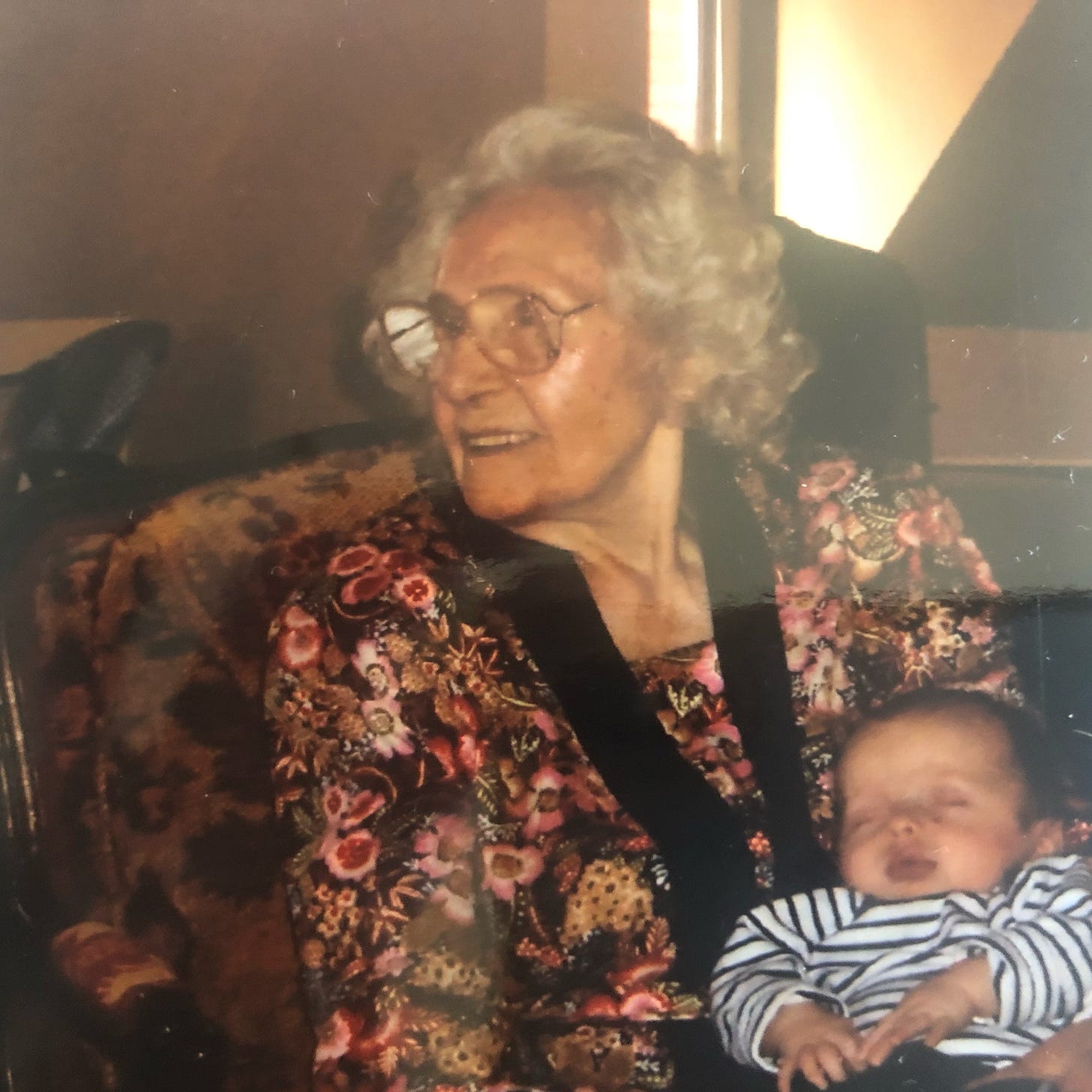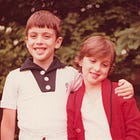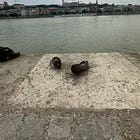I gave my son his name to free him from the weight of the dead. I wonder if I went too far.
The war between Israel and Gaza has not only created a rift in the world but a rift in our home. Read the latest instalment of The Synagogue at the End of the World
Azriel with my grandmother, a Holocaust survivor, during his pidyon haben. It’s a rare Orthodox Jewish tradition that entails “buying back” the firstborn from the Kohenim (the priestly tribe.) It’s only done for a boy who is the first born, born vaginally (i.e. not via Caesarian section), when neither grandfather is a Kohen or Levi, and not after a miscarriage (phew!)
He was scheduled to arrive on Valentine’s Day but surprised us five weeks early. That was 20 years ago. I can still recall my terror as I monitored my leaking amniotic fluid and begged the hospital to admit me, while the triage nurses debated whether I was in labour. They told me to go home and come back in a few hours, but I refused to leave. It was my first real fight for my son.
His body was blue when he finally came out and he was rushed away. Shortly after, I found myself in a recovery room, surrounded by three other mothers cradling their newborns when I had yet to touch mine. They eyed me with quiet horror. I broke out in hives as if the sudden absence of him left me toxic. The attending physician came in and told me with a smile that my son was receiving treatment in the NICU. “If this were 100 years ago, you would both be dead," he added.
My brain rebooted in anger, and I turned into a mom, with the singular goal to protect my son at all costs. Azriel needed me.
Azriel. While in labour, I decided to change the name we spent weeks discussing to Azriel. It means God is my help. I’m still not sure exactly where that name came from – I don’t remember ever hearing it before – but some instinct kicked in, that even if he didn’t follow in my faith, this name would protect him.
Names carry mystical powers in Judaism. Some believe they can cure you when you are ill, and will change a sick person’s name to Chaim or Chaya (meaning life) in order to trick the angel of death.
In so much of scripture, naming and creating are two sides of the same coin. Adam in Hebrew comes from the word for earth, adamah. Eve, or Chava in Hebrew, means to give life.
According to the Talmud, parents participate in a prophesy with God when picking a name. It even goes so far as to suggest that an angel whispers the name to the parent that the baby will embody.
I think of that moment now, 20 years later, and wonder what that spirit knew that I am only still learning. Who knew back then that my Azriel would be the kind of person that intervenes when he believes a stranger on the subway is being mistreated? Who knew that he would have the presence to speak to anyone, young and old, with patience and interest, as if they were the only person that mattered in the world?
But my goal at the time was not only to protect Azriel with this name; it was to set him free from the past. It’s an Ashkenazi custom to name people after the dead. Normally, they are secondary, Hebrew names. Out of my four names, two belong to my grandfather’s sisters, who died as teenagers in the Holocaust. My brother has five names, three for the dead. And we can go back, each name of my living family members acts as reminder of a different tragedy. Few died of old age, it seems.
When my nephew was named after my beloved uncle, I winced with the knowledge that he died of addiction and leukemia and worried the baby would inherit even a whiff of his namesake’s less desirous traits.
What if, I wondered, by naming my son after no one I knew, I could free him from the weight of the dead? What if the stories of family members being hanged, shot, and disappearing didn’t transmit into his DNA but ended with me? What would the world look like for him?
Not everyone agreed with my decision, especially my dad, who believed the name Azriel made him anything but safe.
“You can’t name him that,” my father said in no uncertain terms after my son was born. “They’ll know he’s Jewish. He’ll never be able to hide. They will find him.”
My father was born in hiding in Bratislava, Czechoslovakia, in 1944. His parents, my grandparents, secured false names and identification cards. My grandfather once said that my father was the only boy circumcised in the city that year and for most of his life, my father felt more comfortable practicing his faith in the shadows. But this was Canada, I argued, finding his concerns almost quaint since they were so out of touch.
“Who are ‘they?’” I asked him at the time, combatively.
Who are they, indeed? After October 7, when Hamas killed approximately 1200 people with shocking brutality, taking 240 hostages, it’s a question I’m asking myself again. The devastating retribution by the Israeli government – a government I’ve often been critical of – has created a rift in the world, but it has also created one in my home. And I’m torn between supporting my son’s right to his own beliefs and the knowledge that he carries a name that almost immediately identifies him as Jewish.
Except, in his mind, there is no internal conflict. Azriel says he feels no antisemitism as he protests outside of the Israeli consulate or the university. His face is featured prominently in newspaper photos holding a sign, with a hammer and sickle, demanding “Intifada until victory.” Israel, he tells me without flinching, is a failed colonial experiment and refuses to have any war waged on his behalf. “Not in my name,” he argues.
Not in my name. The phrase catches me by surprise after years of believing that names determine your destiny. I wonder if it’s possible at his stage in life to divorce your name from your background, and turn it into something different.
“Do you really feel it’s like 1939 all over again?” he asks me, genuinely puzzled, after I call the October 7th attack by Hamas a “pogrom” in a Substack post.
“Yes, I do,” I say clutching the large, chai necklace I’ve worn ever since.
Azriel smiles, as if to indulge me, his elder stuck with her old-fashioned ideas. This war has shown me that there are things we still don’t know about each and I briefly wonder, if not naming him after the dead cut him too free.
So much more than the fear of death follows you when you are raised by survivors of a genocide. There’s the guilt, the loss, the ever-present hint of sadness. Many idealize survivors, but for the most part, there is no rhyme or reason why they survived, and others didn’t. They weren’t smarter or stronger or more nimble. Luck and chance play an important part.
Like a gambler, there is the underlying fear that as a descendent, if you don’t play your cards right, your luck will run out. Or worse, that the fates only bought you a certain amount of time and one day, they will come to collect. There is a constant need to do more, to prove that somehow your family’s life, and consequently your own, was worth saving in the grand scheme of things.
Maybe, just maybe, that desire to prove why you needed to survive peters out by the third and fourth generation. After all, if you go back far enough, aren’t we all tinged by tragedy?
In my more optimistic moments, I tell myself that choosing not to name my son after the many victims or survivors of the Holocaust in our family has given him the freedom to worry about all humans, not only the ones in our tribe. Maybe that’s what the angel was trying to tell me.
But in other moments, I worry that my decision has left him untethered from something important. I’ve broken the loop. And in a worst case scenario, he won’t know how to protect himself. Now it’s his turn to scoff at me and say “who are they?” while I try my hardest not to turn into my parents, who spent a lifetime believing they could only trust people exactly like them.
My dad called me the other day:
“Yedoshka?” (That’s my nickname, as if I don’t have enough names. It means evil girl child. I imagine that title became a self-fulfilling prophecy for my father. We fight a lot.) “How is Azriel?” he asks, and I know there is a catch.
“Why, what did you hear?”
“Someone saw him at the university, putting up posters.”
“I see.”
“It was calling for an Intifada. Who put these ideas in his head?”
“No one, Dad. You know he was active in Marxist groups on campus before the war. This is where that belief is taking him.”
My dad pauses.
“I was a socialist, too, when I was younger.”
“You see. You are not that different.”
“But please tell him something. That in my day, they also killed the Jewish socialists.”
“I will, Dad.”
I will.
Click the ❤️ button! It makes me feel good and helps others discover my work! Also, read other links in the series:







I know I read an early draft of this, so the material is not completely new to me. But I have to say it's really powerful as a post!
Your understanding of names as part of our identity resonates with me, I think there is minor prophecy in our name as part of our character (personality.) Maybe generational trauma rooted from the Holocaust crosses our internal wiring so we're programmed to resist our parent's teaching, or maybe like the "el" part of Azriel, he is what was, what is and what will be, and he will only recognize the incongruency you recognize when/if his children go counter to his teaching.